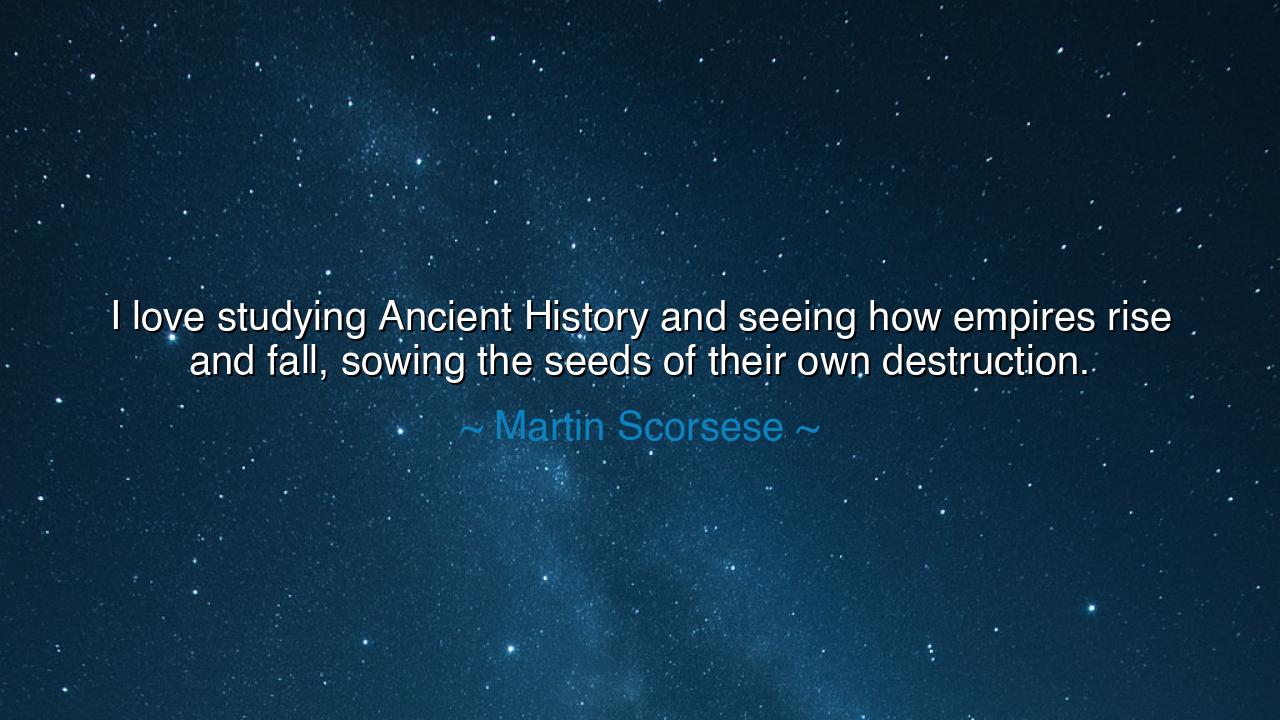
I love studying Ancient History and seeing how empires rise and
I love studying Ancient History and seeing how empires rise and fall, sowing the seeds of their own destruction.






“I love studying Ancient History and seeing how empires rise and fall, sowing the seeds of their own destruction.” – Martin Scorsese
Hear these words, O seekers of wisdom and students of time, spoken by Martin Scorsese, a master not only of film but of human nature. In this reflection, he gazes beyond the silver screen and into the eternal story of civilization itself. When he says, “I love studying Ancient History and seeing how empires rise and fall, sowing the seeds of their own destruction,” he is not merely fascinated by the grandeur of the past. He is meditating on the cycle of creation and decay, on the tragic truth that within the brilliance of every empire lies the whisper of its own ruin. His words are not a historian’s observation—they are a philosopher’s warning.
Scorsese, an artist of profound moral vision, sees in Ancient History the mirror of the human soul. Just as his films explore the rise and downfall of men driven by power, greed, and pride, so too does history tell the same tale on a grander stage. Rome, Greece, Egypt, Babylon—all rose in strength and splendor, believing themselves immortal. Yet their glory carried within it the shadow of excess, the weight of corruption, the blindness of arrogance. Each empire fell not by the hands of strangers, but by its own undoing. Thus, Scorsese’s insight is timeless: the seeds of destruction are sown not by enemies, but by the very hands that once built greatness.
Consider the tale of Rome, that eternal symbol of empire. From humble beginnings, it grew through discipline, courage, and order. Its citizens prized duty over pleasure, and its leaders—at least in its early days—sought virtue and justice. Yet as power expanded, so did vanity. The Republic gave way to tyranny; the citizens grew soft in luxury; the legions once loyal to the state became loyal only to gold and glory. Bread and circuses replaced honor and sacrifice. Thus, Rome did not fall in a single blow—it decayed slowly, from within. The seeds of its ruin were planted in its triumphs: pride where there was once discipline, indulgence where there was once restraint.
Scorsese’s fascination with such cycles reflects his lifelong study of human character. For whether in an empire or a single man, the pattern is the same. The gangster who ascends to power through cunning and courage, the leader who builds a nation through vision and force—all face the same peril: hubris. The Greek tragedians named it well. Hubris is not mere pride; it is blindness born of success. It is the arrogance that makes a man believe he can defy the limits of morality, time, or consequence. In this, the rise of an empire mirrors the rise of an individual. Both climb to greatness through virtue, then fall through corruption. Both are undone by the false belief that power absolves them of restraint.
And so, the study of ancient history becomes, for the wise, a study of the self. Every generation, every nation, walks the same path: from struggle to strength, from strength to dominance, from dominance to decadence, and from decadence to ruin. This is not fate—it is human nature repeating itself. Scorsese’s love of history is thus not nostalgia but vigilance. He sees that to understand how empires fall is to understand how people lose their way—how success, when left unchecked by humility, becomes its own poison.
There is a haunting beauty in this truth, for even as empires crumble, humanity endures. The ashes of the old nourish the soil of the new. Greece gave way to Rome; Rome gave way to Europe; Europe gave birth to a world of nations. The cycle of destruction is also a cycle of renewal. But renewal comes only when the lesson is learned—when the living remember the cost of forgetting. Those who ignore history, said the sages, are condemned to repeat it. But those who heed it may yet break the circle and choose a wiser path.
So let this be the lesson, O listener: study the ruins, for they are not only monuments of failure—they are mirrors of warning. In your own life, beware the same pattern that dooms empires. Guard against pride in success, greed in abundance, and blindness in power. Whether you rule a nation or a household, the same law holds true: greatness must be tempered with humility, ambition with conscience, freedom with responsibility.
And thus, as Martin Scorsese teaches, the fall of empires is not merely a tale of kings and armies—it is the eternal story of the human heart. To study their rise and fall is to study ourselves. For every age, every person, carries within them both the seed of creation and the seed of destruction. Which one takes root depends not on history, but on the wisdom to remember it.






AAdministratorAdministrator
Welcome, honored guests. Please leave a comment, we will respond soon